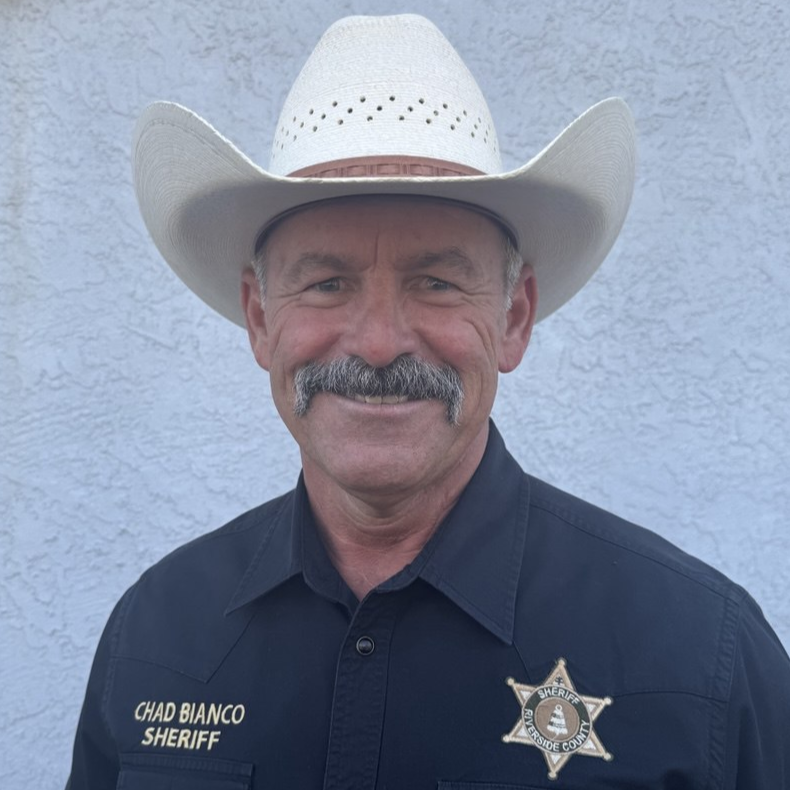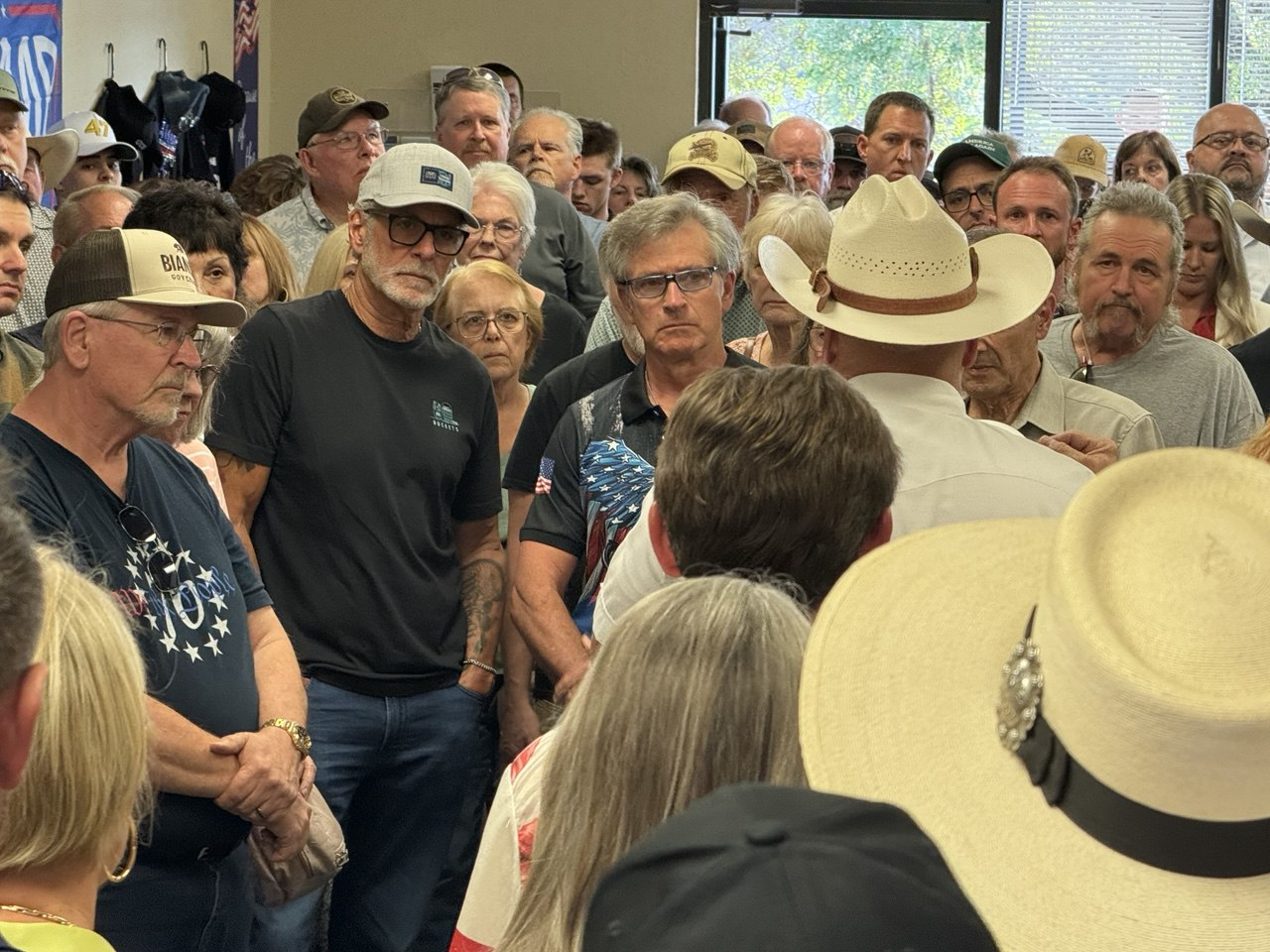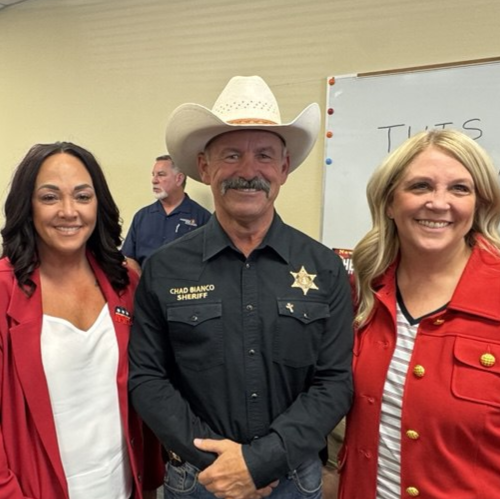Sheriff to Statehouse: Chad Bianco Outlines His Vision for California
Interview with Sheriff Chad Bianco, Republican Candidate for Governor of California
Riverside County Sheriff Chad Bianco is a Republican Candidate for Governor of California
Riverside County Sheriff Chad Bianco has entered the race for Governor of California, bringing with him over 30 years of experience in law enforcement and a public profile that grew during the COVID-19 pandemic. Known for his outspoken views on government overreach, local control, and public safety, Bianco is positioning himself as a candidate focused on leadership, accountability, and reform.
In this interview, Sheriff Bianco discusses the motivations behind his candidacy and how his background in both law enforcement and community coaching has shaped his leadership philosophy. He outlines key issues he believes California must urgently address, including the state’s regulatory environment, taxation, and homelessness response. Bianco also shares his views on restoring local governance, his experiences during the pandemic, and what kind of legacy he hopes to leave if elected.
As the 2026 gubernatorial race begins to take shape, Bianco offers a perspective grounded in his career as a public servant and his concern over what he describes as a lack of effective leadership at the state level. His remarks provide insight into how he would approach California’s challenges and what kind of governor he hopes to be.
Motivation to run
Sheriff Bianco, what motivated you to enter the governor's race, and how has your law enforcement background shaped your approach to leadership?
Law enforcement obviously plays a huge part in the leadership role, especially as you're promoting through the ranks and you have to get a whole bunch of cops to follow your direction, follow your lead, follow the direction you want them to go, whether it's on a call or really whether it's just a department direction. So, law enforcement plays a huge part in it. But honestly, I think my private life, the way I was raised, leads more toward my leadership ability.
El Dorado County Sheriff Jeff Leikauf introduces Chad Bianco to a capacity crowd at the El Dorado County Republican Party Headquarters
And then I tell this story all the time. I was for many years a high school and middle school cross-country baseball and track coach for boys and girls. And if you ever want a lesson in leadership—get a bunch of high school and middle school girls going through puberty—get them out in 100-degree weather to where they throw up, laugh and run some more. You can be a leader. And so, it's really a lifetime of learning how to treat people, learning how to get the most out of people.
The leadership role is why I am running for governor. Over the last six years as sheriff, it is very obvious to me and very apparent when I embed myself in Sacramento or when I have to speak in front of committees or anything like that—Sacramento is lacking in leadership.
I don't want to insult any voters, but I don't think we've ever had the opportunity for many, many, many years to actually elect a leader. We elect personalities or we elect a celebrity, and just that charisma or something like that, but we're not electing leaders, we're not electing character, we're not putting enough emphasis on their ability to lead others in a direction to serve others. So, all of that combination of my leadership ability and then 32 years of service to other people, and I think that's really what makes the difference in my resume compared to anyone else's.
And then knowing that something drastic has to change in the direction of California for us to get better and back on the right track. Looking at the names of the people that are stepping up to do it, it wasn't going to happen. It's either going to be the same or worse. And that's why I made the decision to do it.
The first change
You've been vocal about restoring common sense in Sacramento. What are a few key things you think need to change right away?
Regulation is number one. The regulations in California, in business, in oil, in building, in our businesses. Regulation is driving everyone out of California. Regulation is just a hidden tax. Taxes are number one. Taxes are the highest in the country. California taxes its residents higher than any other place in the country. So that's number one.
Number two is regulation because regulations are just a hidden tax. It's a hidden way to make money. So, taxes and regulations absolutely have to be either severely lowered or eliminated altogether. Most of the regulations that we have are in excess of what federal regulations are, what the rest of the country is doing. We are in excess. And that is what is driving up the cost of living, the cost of business, preventing people from either being able to open their businesses or keep their business profitable, which is making them leave.
Everyone that you talk to that leaves California---no one is leaving because of the weather. No one is leaving because of the people of California in general. They're leaving because of regulations, taxes, and the direction of government. And we have to change those.
Homelessness
One issue we hear about constantly is the homelessness crisis. From your experience on the ground, what do you believe is actually working, and what would you do differently at the state level?
Yeah, there is nothing working in homelessness right now because we keep calling it homeless. This has turned into a homeless industrial complex. There is so much money being dumped and wasted into nonprofits and NGOs that have absolutely no impact on the people that we see on the streets.
The drug addicted, the mental illness, those people that we see on the streets, they are not homeless. They all had homes, and they were either kicked out of their homes or they lost their homes because of their drug and alcohol addiction. Drug and alcohol addiction is causing a psychosis and that's what we see when we think of someone homeless on the street corner in the park that's screaming out of their mind or those people that we're contacting.
And until we stop this unbelievable flow of money to these people that are not doing anything, this complex, this industrial complex that is making money off of the taxpayers—until we stop that and actually put [money] into the treatment, the mental health treatment, the alcohol and drug treatment for these people to get them sober, to get them back to be productive members of society and back with their families—we will never fix this problem, and it starts by stopping calling it homeless.
Local control
You've always emphasized the importance of local control. How would your administration respect and support local communities instead of dictating from the top?
Sheriff Chad Bianco on the campaign trail in Cameron Park, with Loomis Councilmember Amanda Cortez (left) and Lincoln Mayor Holly Andreatta (right)
Absolutely. The state of California is supposed to set the agenda for California, but the bottom line is, our government was set up for local control. Our cities, our counties, our towns should have more say and more power in how they run their cities, how they develop their cities than the state does. The state should not be imposing anything on everyone in the state because when you make an overarching policy or law or agenda, every other place in the state is different.
What's good for Los Angeles is not good for “here.” What's good for Folsom is not good for Riverside. Every single place is different, and you have to let the local governments control what they're doing in their area because they know what they need. They know what they're short. They know what they don't need and they know what their residents want.
Individual rights
During COVID, you took a stand for individual rights and local decision making. What was that like and what did you learn about leadership in times of crisis?
That's probably my introduction into the State of California and the lack of leadership. I truly wished there would have been more leaders standing up for what is right.
The number one attribute of a leader is you care more about other people than you care about yourself. You are willing to sacrifice yourself for the betterment of other people. And particularly in the politic world: I took a stand against the government's position and the mandates that government was imposing on us because not only did I know it was wrong, I knew that the underlying reasons why they made their decisions were not truthful. And so the impositions, the government overreach that went into our businesses, into our schools, into our churches, into our residents—I was standing the line between that. The sheriff was standing the line between the overreach of government and the protection of our residents.
And when I did that, not only across the state and the country, but my county—the overwhelming support that I got from my county was not common. The response that I got from my residents was just overwhelming. And then that spread and then that allowed other people to do the same thing.
Unfortunately, I think sometimes they were looking at those other people that were in leadership positions. They were looking at it from a political perspective and whether or not they would get elected again. And for me, it was I’m just doing the right thing; if that's not what people want, then don't elect me. But I'm doing the right thing for the people that I represent. And it was an easy decision for me.
It’s easy to talk. It's not easy to actually do. Leadership is easy to talk about, but actually doing it, having the heart and the courage to do it is not common at all. And I think that's whether it's God given or whether it's how my parents raised me or my life, how my job and my extracurricular activities with coaching did. It certainly has prepared me to make these leadership decisions for other people.
What would be your legacy?
If you had to sum it up, what kind of legacy would you hope to leave behind as governor of California?
It is definitely not a personal legacy. I'm not interested in personal accolades or pats on the back. You know, once in a while you get a thank you or you get something like that. That's good enough for me. If I was going to leave a legacy, it would be that the California dream is alive and still attainable for every American that wants to move here to achieve it.



